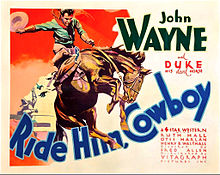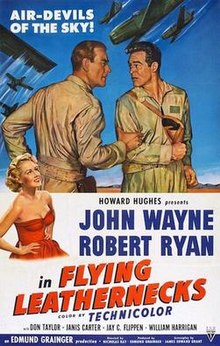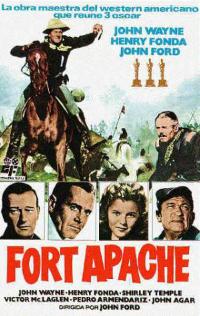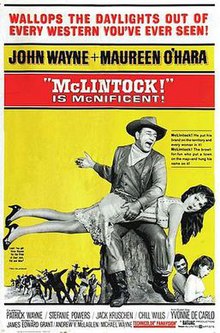Welcome to DU!
The truly grassroots left-of-center political community where regular people, not algorithms, drive the discussions and set the standards.
Join the community:
Create a free account
Support DU (and get rid of ads!):
Become a Star Member
Latest Breaking News
Editorials & Other Articles
General Discussion
The DU Lounge
All Forums
Issue Forums
Culture Forums
Alliance Forums
Region Forums
Support Forums
Help & Search
Classic Films
Related: About this forumTCM Schedule Saturday 8/3/24 - Summer Under the Stars John Wayne (also Ida Lupino)

Annual SUMMER UNDER THE STARS Celebration
- Each day features films for a selected actor
- No Star of the Month, Spotlights, or Showcases
THE DAY AT A GLANCE
- SUMMER UNDER THE STARS - IDA LUPINO
- SUMMER UNDER THE STARS - IDA LUPINO
While the City Sleeps (1956)
Big Knife, The (1955)
Hard Way, The (1942)
THE DAY AT A GLANCE
- SUMMER UNDER THE STARS - JOHN WAYNE
- SUMMER UNDER THE STARS - JOHN WAYNE
Ride Him, Cowboy (1932)
Telegraph Trail, The (1933)
Man from Monterey, The (1933)
Randy Rides Alone (1934)
Flying Leathernecks (1951)
Stagecoach (1939)
Fort Apache (1948)
Train Robbers, The (1973)
McLintock! (1963) - TCM PRIMETIME
Sons of Katie Elder, The (1965)
Red River (1948)
Legend of the Lost (1957)
Angel and the Badman (1947)
Tall in the Saddle (1944)
SUMMER UNDER THE STARS - IDA LUPINO
12:00 AM While the City Sleeps (1956)

&pp=ygUddFJBTztFUiB3aGlsZSB0aGUgY2l0eSBzbGVlcHM%3D
Trivia: According to film noir historian Eddie Muller in the commentary for this film, Dana Andrews was drunk during the entire production. (Andrews himself admitted that he was an alcoholic in the 1950s.) Ironically, his character is drunk throughout half the film.
Reporters compete to catch a serial killer.
Dir: Fritz Lang Cast: Dana Andrews, Rhonda Fleming, George Sanders
Runtime: 99 mins Genre: Crime Rating: TV-PG CC: Y
2:00 AM The Big Knife (1955)

&pp=ygUVdHJhaWxlciBUaGUgQmlnIEtuaWZl
&pp=ygUVdHJhaWxlciBUaGUgQmlnIEtuaWZl
An unscrupulous movie producer blackmails an unhappy star into signing a new contract.
Dir: Robert Aldrich Cast: Jack Palance, Ida Lupino, Wendell Corey
Runtime: 111 mins Genre: Drama Rating: TV-PG CC: Y
Trivia: Because of its vitriolic take on Tinseltown, this was unsurprisingly turned down by all the major studios in Hollywood. It eventually found a home at United Artists.
4:00 AM The Hard Way (1942)

&pp=ygUZdHJhaWxlciBUaGUgSGFyZCBXYXkgMTk0Mw%3D%3D
An ambitious woman doesn't care who she hurts in her drive to make her sister a star.
Dir: Vincent Sherman Cast: Ida Lupino, Dennis Morgan, Joan Leslie
Runtime: 109 mins Genre: Drama Rating: TV-G CC: Y
Trivia: Per director Vincent Sherman, the film was based on dancer-actress Ginger Rogers' relationship with her quintessential stage-mother, Lela E. Rogers.
SUMMER UNDER THE STARS - JOHN WAYNE
6:00 AM Ride Him, Cowboy (1932)

&pp=ygUYdHJhaWxlciBSaWRlIEhpbSwgQ293Ym95
A cowboy tames a wild horse suspected of killing a man, then rides out to find the real culprit.
Dir: Fred Allen Cast: John Wayne, Duke, Ruth Hall
Runtime: 61 mins Genre: Western Rating: TV-G CC: Y
7:00 AM The Telegraph Trail (1933)

&pp=ygUcdHJhaWxlciBUaGUgVGVsZWdyYXBoIFRyYWlsIA%3D%3D
An Army scout volunteers to string telegraph wires through Indian territory.
Dir: Tenny Wright Cast: John Wayne, Duke, Frank McHugh
Runtime: 60 mins Genre: Western Rating: TV-G CC: Y
Trivia: This is the film that James Cagney used to show an example of talking pictures, and the reason for his impending unemployment in Footlight Parade (1933). Ironically, actor Frank McHugh, who plays John Wayne's sidekick in this film, also appears in Footlight Parade (1933), and watches himself on the movie screen in the other film.
8:00 AM The Man from Monterey (1933)

&pp=ygUddHJhaWxlciBUaGUgTWFuIGZyb20gTW9udGVyZXk%3D
A U.S. Cavalry officer tries to protect Spanish landowners in California.
Dir: Mack V. Wright Cast: John Wayne, Duke, Ruth Hall
Runtime: 59 mins Genre: Western Rating: TV-G CC: Y
Trivia: Leon Schlesinger, who in addition to creating and overseeing the Warner Bros. animation unit, also produced films for the studio's B-western unit. He signed a broad-shouldered young actor named John Wayne partly out of his physical resemblance to Warners' silent-era cowboy star Ken Maynard in order to more easily match the stunts and footage taken from the earlier Maynard silents that were to be inserted into a series of remakes of those films, of which this is one.
9:00 AM Randy Rides Alone (1934)

&pp=ygUZdHJhaWxlciBSYW5keSBSaWRlcyBBbG9uZQ%3D%3D
An undercover agent searches for a murderous outlaw.
Dir: Harry Fraser Cast: John Wayne, Alberta Vaughn, George Hayes
Runtime: 60 mins Genre: Western Rating: TV-G CC: Y
Trivia: Though released in 1934 (5-6 years after the first talkies), the film is shot very much like a silent movie. Some scenes are silent except for the random sound effect. Dialog seems kept to a minimum, and sound quality of dialog is generally very poor (though this may be related to the quality of the specific print being shown by TCM). Camera moves are sometimes shaky and frame rate often makes movement jerky.
10:00 AM Flying Leathernecks (1951)

&pp=ygUbdHJhaWxlciBGbHlpbmcgTGVhdGhlcm5lY2tz
The exploits and personal battles of United States Marine Corps aviators during World War II.
Dir: Nicholas Ray Cast: John Wayne, Robert Ryan, Don Taylor
Runtime: 102 mins Genre: War Rating: TV-PG CC: Y
Trivia: John Wayne and Robert Ryan managed to put aside their vast political differences while making this film. Ryan was appalled by Wayne's support for blacklisting, extending the Korean War by launching nuclear strikes on Chinese cities, and using military force to drive the Soviets out of eastern Europe. They later did not get along at all while filming The Longest Day (1962).
12:00 PM Stagecoach (1939)

&pp=ygUSdHJhaWxlciBTdGFnZWNvYWNo
&pp=ygUOU3RhZ2Vjb2FjaCB0Y20%3D
Stagecoach is a 1939 American Western film directed by John Ford and starring Claire Trevor and John Wayne in his breakthrough role. The screenplay by Dudley Nichols is an adaptation of "The Stage to Lordsburg", a 1937 short story by Ernest Haycox. The film follows a group primarily composed of strangers riding on a stagecoach through dangerous Apache territory.
The film has long been recognized as an important work that transcends the Western genre. In 1995, the film was deemed "culturally, historically, or aesthetically significant" by the United States Library of Congress and selected for preservation in their National Film Registry.[3] Still, Stagecoach has not avoided controversy. Like most Westerns of the era, its depiction of Native Americans as simplistic savages has been criticized.[4]
Stagecoach was the first of many Westerns that Ford shot in Monument Valley, on the Arizona–Utah border in the American Southwest. Many of the movies Ford filmed there also starred John Wayne. Scenes from Stagecoach, including a sequence introducing Wayne as the Ringo Kid, blended shots of Monument Valley with those filmed on the Iverson Movie Ranch in Chatsworth, California, RKO Encino Ranch, and other locations. As a result, geographic incongruities appear, including the closing scene where Ringo (Wayne) and Dallas (Trevor) depart Lordsburg in southwestern New Mexico by way of Monument Valley.
Dir: John Ford Cast: Claire Trevor, John Wayne, Andy Devine
Runtime: 96 mins Genre: Western Rating: TV-G CC: Y
Oscar nominations (two wins):
(*WINNER*) ACTOR IN A SUPPORTING ROLE -- Thomas Mitchell {"Dr. Josiah Boone"}
ART DIRECTION -- Alexander Toluboff
CINEMATOGRAPHY (Black-and-White) -- Bert Glennon
DIRECTING -- John Ford
FILM EDITING -- Otho Lovering, Dorothy Spencer
(*WINNER*) MUSIC (Scoring) -- Richard Hageman, Frank Harling, John Leipold, Leo Shuken
OUTSTANDING PRODUCTION -- Walter Wanger (production company)
(*WINNER*) ACTOR IN A SUPPORTING ROLE -- Thomas Mitchell {"Dr. Josiah Boone"}
ART DIRECTION -- Alexander Toluboff
CINEMATOGRAPHY (Black-and-White) -- Bert Glennon
DIRECTING -- John Ford
FILM EDITING -- Otho Lovering, Dorothy Spencer
(*WINNER*) MUSIC (Scoring) -- Richard Hageman, Frank Harling, John Leipold, Leo Shuken
OUTSTANDING PRODUCTION -- Walter Wanger (production company)
Trivia: John Ford liked to bully actors on the set, and this movie was no exception. At one point, he said to Andy Devine, "You big tub of lard. I don't know why the hell I'm using you in this picture." Undaunted, Devine replied, "Because Ward Bond can't drive six horses." Likewise, he attacked Thomas Mitchell, who eventually retorted, "Just remember: I saw [Ford's earlier film] Mary of Scotland (1936)," effectively humbling the director. Worst of all was Ford's treatment of John Wayne. He called him a "big oaf" and a "dumb bastard" and continually criticized his line delivery and manner of walking, even how he washed his face on camera. However, at least part of this was to provoke the actor into giving a stronger performance. Claire Trevor recalls how Ford grabbed Duke by the chin and shook him. "Why are you moving your mouth so much?" he said. "Don't you know you don't act with your mouth in pictures? You act with your eyes." Wayne tolerated the rough treatment and rose to the challenge, reaching a new plateau as an actor. Ford helped cement the impression that Wayne makes in the film by giving him plenty of expressive reaction shots throughout the picture.
1:45 PM Fort Apache (1948)

&pp=ygUTdHJhaWxlciBGb3J0IEFwYWNoZQ%3D%3D
&pp=ygUPZm9ydCBhcGFjaGUgdGNt
An experienced cavalry officer tries to keep his new, by-the-books commander from triggering an Indian war.
Dir: John Ford Cast: John Wayne, Henry Fonda, Shirley Temple
Runtime: 127 mins Genre: Western Rating: TV-PG CC: Y
Trivia: Shirley Temple, in one of her first adult roles, was pregnant during shooting and worried that riding horses or wearing her corset too tight would induce miscarriage.
4:00 PM The Train Robbers (1973)

&pp=ygUZdGhlIHRyYWluIHJvYmJlcnMgdHJhaWxlcg%3D%3D
A bandit's widow enlists a famed gunman to return the gold her husband stole.
Dir: Burt Kennedy Cast: John Wayne, Rod Taylor, Ricardo Montalban
Runtime: 92 mins Genre: Western Rating: TV-14 CC: Y
Trivia: John Wayne fractured two ribs shortly before shooting began, causing such pain that he had difficulty sleeping at night. As a result, the action scenes had to be scaled down to accommodate his condition, but the tough-minded actor refused to delay the shoot, displaying the same determination and sense of personal integrity which distinguished his on-screen persona.
Trivia: Director Burt Kennedy wanted to cast Jack Elam as Grady. However John Wayne would not allow this because he said Elam had stolen too many scenes from him in "Rio Lobo (1970)."
5:45 PM McLintock! (1963)

&pp=ygUOTWNMaW50b2NrISBUQ00%3D
A rancher contends with an estranged wife who wants a divorce and a college-aged daughter who's in love with the son of one of his enemies.
Dir: Andrew V. Mclaglen Cast: John Wayne, Maureen O'Hara, Patrick Wayne
Runtime: 127 mins Genre: Western Rating: TV-PG CC: Y
Trivia: Maureen O'Hara wrote in her autobiography that the famous climactic spanking scene was completely authentic and that John Wayne carried it out with such gusto that she had bruises for a week.
Trivia: In 1991, the film entered the public domain in the United States because the claimants did not renew its copyright registration in the 28th year after publication.
8:00 PM The Sons of Katie Elder (1965)

&pp=ygUfdHJhaWxlciBUaGUgU29ucyBvZiBLYXRpZSBFbGRlcg%3D%3D
Ranch owner Katie Elder's four sons vow to avenge the murder of their father and the swindling of their mother.
Dir: Henry Hathaway Cast: John Wayne, Dean Martin, Martha Hyer
Runtime: 122 mins Genre: Western Rating: TV-PG CC:
Trivia: This movie marked the return of John Wayne to work after having a cancerous lung and two ribs removed just four months earlier. He insisted on doing some of his own stunts to show the public that the illness hadn't slowed him down. Dean Martin later said of John Wayne, "Someone else would have laid around, feeling sorry for himself, for a year. But Duke, he just doesn't know how to be sick. He's recuperating the hard way. He's two loud speaking guys in one. Me, when people see me, they sometimes say, 'Oh, there goes Perry Como.' But there's only one John Wayne, and nobody makes any mistakes about that".
10:15 PM Red River (1948)

&pp=ygURdHJhaWxlciBSZWQgUml2ZXI%3D
A young cowhand rebels against his rancher stepfather during a perilous cattle drive.
Dir: Howard Hawks Cast: John Wayne, Montgomery Clift, Joanne Dru
Runtime: 125 mins Genre: Western Rating: TV-PG CC: Y
Oscar nominations (no wins):
FILM EDITING -- Christian Nyby
WRITING (Motion Picture Story) -- Borden Chase
FILM EDITING -- Christian Nyby
WRITING (Motion Picture Story) -- Borden Chase
Trivia: Film debut of Montgomery Clift. (Filmed in 1946, the movie was held for release for two years in part due to legal problems with Howard Hughes, who claimed it was similar to his The Outlaw (1943). The first film the public saw of Clift was The Search (1948), for which he was nominated for the Academy Award for Best Actor.) Montgomery Clift was nervous about standing up to John Wayne but gained confidence when Howard Hawks told him to play his scenes like David against Goliath. He also urged the young actor to underplay in his scenes with Wayne, particularly the scene in which his character challenges Dunson for the first time. Wayne was also not sure Clift could be convincing as a rugged cowboy, but after that first confrontation scene he told Hawks his doubts were gone and "he's going to be okay."
Trivia: Howard Hawks shot the beginning of the cattle drive in close-ups of each of the principal cowhands because he felt tight shots would be needed to help the audience keep all the characters straight in their minds. To that end, he also gave them all different kinds of hats, including a derby. Montgomery Clift used Hawks' own hat, which was given to him by Gary Cooper. Cooper had imparted a weather-beaten look to the hat by watering it every night. "Spiders built nests in it," Hawks said. "It looked great."
Trivia: After seeing John Wayne's performance in the film, directed by rival director Howard Hawks, John Ford was quoted as saying, "I never knew the big son of a bitch could act." This led to Ford casting Wayne in more complex, multi-layered, and dramatic roles in films like She Wore a Yellow Ribbon (1949), The Searchers (1956), and The Man Who Shot Liberty Valance (1962). However, it is worth noting that the only source for Ford's quote was Howard Hawks himself, who always liked to make himself look good in relation to other famous directors.
12:45 AM Legend of the Lost (1957)

&pp=ygUadHJhaWxlciBMZWdlbmQgb2YgdGhlIExvc3Q%3D
American adventurer Joe January is hired to take Paul Bonnard on an expedition into the desert in search of treasure.
Dir: Henry Hathaway Cast: John Wayne, Sophia Loren, Rossano Brazzi
Runtime: 109 mins Genre: Adventure Rating: TV-PG CC: N
Trivia: John Wayne broke his leg during filming, causing a three-week delay in the production schedule before shooting resumed in Rome at Cinecittà Studios, where interior sequences were shot.
2:45 AM Angel and the Badman (1947)

&pp=ygUcYW5nZWwgYW5kIHRoZSBiYWRtYW4gdHJhaWxlcg%3D%3D
When a Quaker girl nurses a notorious gunman back to health, he tries to adopt her peaceful ways.
Dir: James Edward Grant Cast: John Wayne, Gail Russell, Harry Carey
Runtime: 100 mins Genre: Western Rating: TV-G CC: Y
Trivia: Clips from this movie were used in the flashback scenes in John Wayne's final movie, The Shootist (1976).
4:30 AM Tall in the Saddle (1944)

&pp=ygUaVGFsbCBpbiB0aGUgU2FkZGxlIHRyYWlsZXI%3D
A woman-hating cowboy signs on with a lady rancher.
Dir: Edwin L. Marin Cast: John Wayne, Ella Raines, Ward Bond
Runtime: 87 mins Genre: Western Rating: TV-PG CC: Y
Trivia: This film was the final pairing of John Wayne (Rocklin) and George 'Gabby' Hayes (Dave) on screen. The two long time on and off screen friends had first worked together on "Riders of Destiny" (1933). Hayes was billed as just George Hayes, played Charlie Denton and Wayne played the role of singing cowboy and gunslinger Singin' Sandy Saunders. The two actors were very close in real life. Wayne's children thought of Hayes as an uncle and Hayes often described Wayne as the son he always wanted.